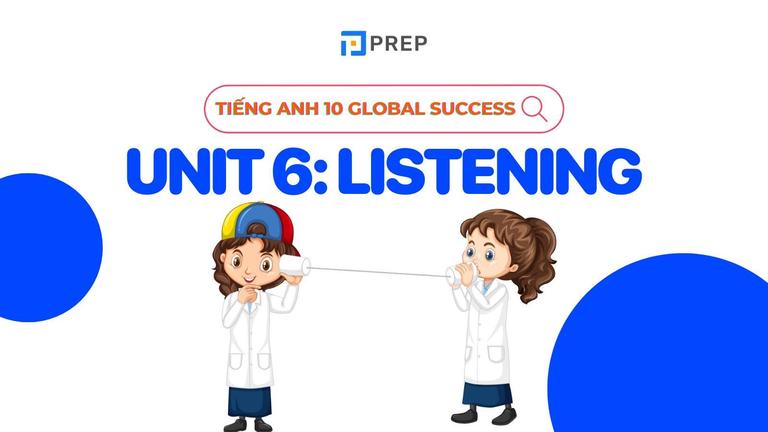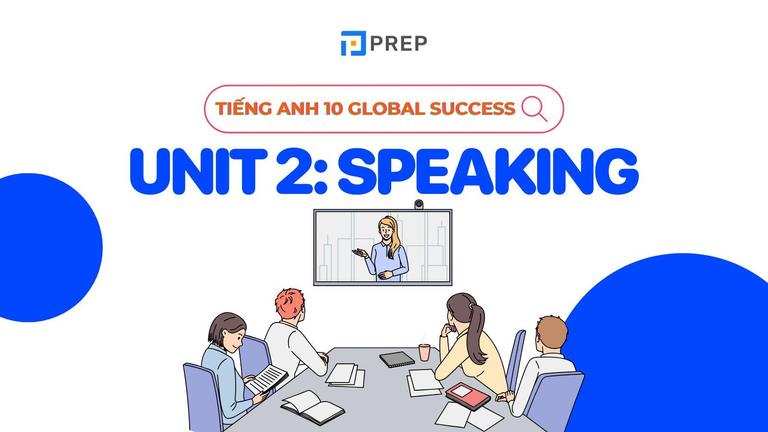Đề bài và giải thích đáp án chi tiết Cambridge IELTS 14 test 1 passage 1 the importance of children's play
Passage 1 của Test 1, Cambridge IELTS 14 là bài đọc có chủ đề khá dễ, từ vựng cơ bản. Trong bài viết sau, cùng Prep xem lại đề bài và đáp án chi tiết đồng thời take note một số từ vựng hay trong bài để mở rộng vốn từ nhé!
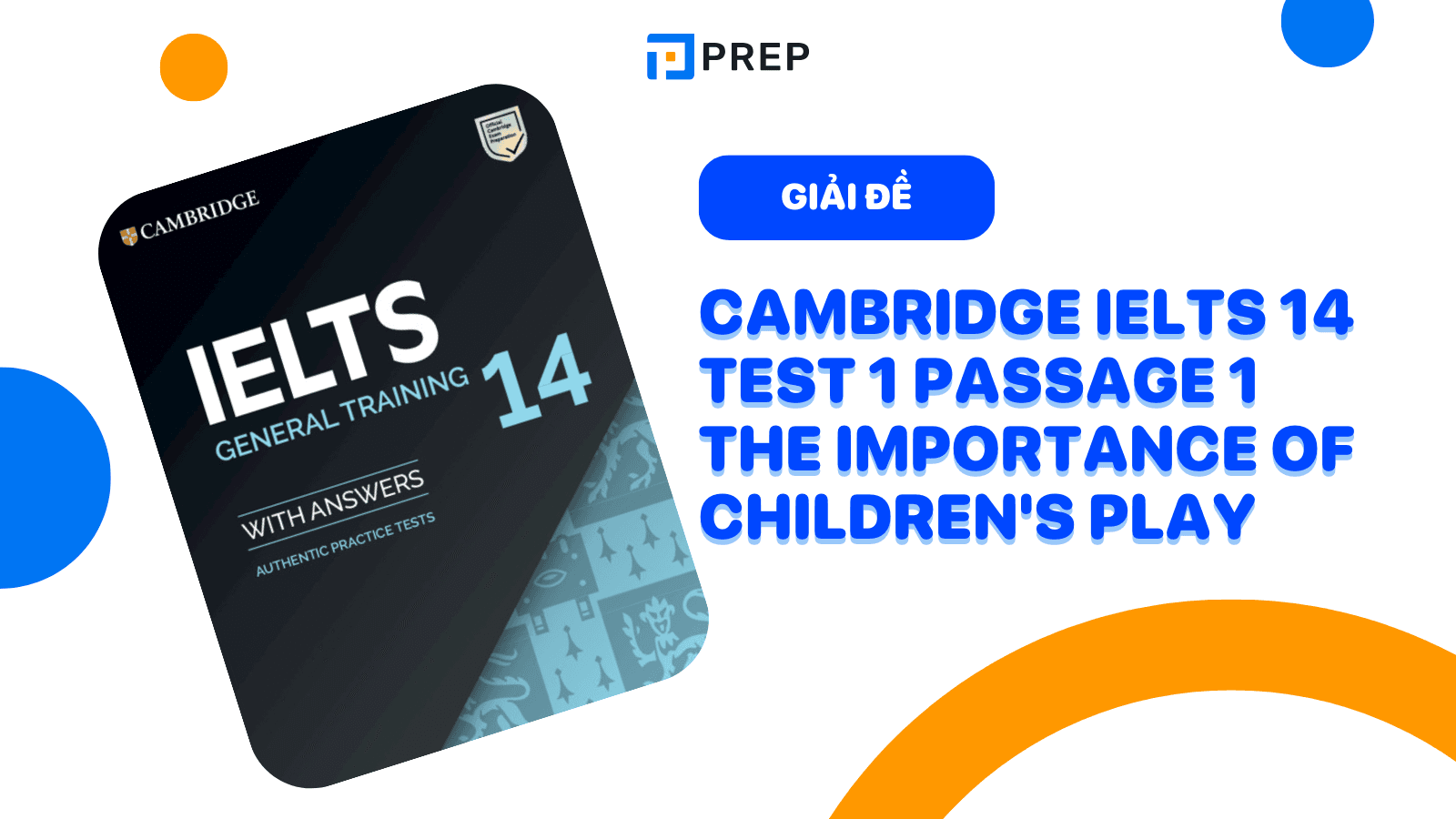
Đề bài và đáp án đề Cambridge IELTS 14 test 1 passage 1 the importance of children's play
I. Đề bài Cambridge IELTS 14 test 1 passage 1 the importance of children's play
Brick by brick, six-year-old Alice is building a magical kingdom. Imagining fairy-tale turrets and fire-breathing drag ons, wicked witches and gallant heroes, she’s creating an enchanting world. Although she isn’t aware of it, this fantasy is helping her take her first steps towards her capacity for creativity and so it will have important repercussions in her adult life.
Minutes later, Alice has abandoned the kingdom in favour of playing schools with her younger brother. When she bosses him around as his ‘teacher’, she’s practising how to regulate her emotions through pretence. Later on, when they tire of this and settle down with a board game, she’s learning about the need to follow rules and take turns with a partner.
Play in all its rich variety is one of the highest achievements of the human species,’ says Dr David Whitebread from the Faculty of Education at the University of Cambridge, UK. ‘It underpins how we develop as intellectual, problem-solving adults and is crucial to our success as a highly adaptable species.
Recognising the importance of play is not new: over two millennia ago, the Greek philosopher Plato extolled its virtues as a means of developing skills for adult life, and ideas about play-based learning have been developing since the 19th century.
But we live in changing times, and Whitebread is mindful of a worldwide decline in play, pointing out that over half the people in the world now live in cities. ‘The opportunities for free play, which I experienced almost every day of my childhood, are becoming increas lớp ingly scarce,’ he says. Outdoor play is curtailed by perceptions of risk to do with traffic, as well as parents’ increased wish to protect their children from being the victims of crime, and by the emphasis on ‘earlier is better’ which is leading to greater competition in academic learning and schools.
International bodies like the United Nations and the European Union have begun to develop policies concerned with children’s right to play, and to consider implications for leisure facilities and educational programmes. But what they often lack is the evidence to base policies on.
Dr Jenny Gibson agrees, pointing out that although some of the steps in the puzzle of how and why play is important have been looked at, there is very little data on the impact it has on the child’s later life.
Now, thanks to the university’s new Centre for Research on Play in Education, Development and Learning (PEDAL), Whitebread, Baker, Gibson and a team of researchers hope to provide evidence on the role played by play in how a child develops.
‘A strong possibility is that play supports the early development of children’s self-control,’ explains Baker. ‘This is our ability to develop awareness of our own thinking processes – it influences how effectively we go about undertaking challenging activities.’
In a study carried out by Baker with toddlers and young preschoolers, she found that children with greater self-control solved problems more quickly when exploring an unfamiliar set-up requiring scientific reasoning. ‘This sort of evidence makes us think that giving children the chance to play will make them more successful problem-solvers in the long run.’
If playful experiences do facilitate this aspect of development, say the researchers, it could be extremely significant for educational practices, because the ability to self-regulate has been shown to be a key predictor of academic performance.
Gibson adds: ‘Playful behaviour is also an important indicator of healthy social and emotional development. In my previous research, I investigated how observing children at play can give us important clues about their well-being and can even be useful in the diagnosis of neurodevelopmental disorders like autism.’
Whitebeard’s recent research has involved developing a play-based approach to supporting children’s writing. ‘Many primary school children find writing difficult, but we showed in a previous study that a playful stimulus was far more effective than an instructional one.’ Children wrote longer and better-structured stories when they first played with dolls representing characters in the story. In the latest study, children first created their story with Lego*, with similar results. ‘Many teachers commented that they had always previously had children saying they didn’t know what to write about. With the Lego building, however, not a single child said this through the whole year of the project.’
Whitebread, who directs PEDAL, trained as a primary school teacher in the early 1970s, when, as he describes, ‘the teaching of young children was largely a quiet backwater, untroubled by any serious intellectual debate or controversy.’ Now, the landscape is very different, with hotly debated topics such as school starting age.
‘Somehow the importance of play has been lost in recent decades. It’s regarded as something trivial, or even as something negative that contrasts with “work”. Let’s not lose sight of its benefits, and the fundamental contributions it makes to human achievements in the arts, sciences and technology. Let’s make sure children have a rich diet of play experiences.’
Questions
Questions 1-8
Complete the notes below.
Choose ONE WORD ONLY from the passage for each answer.
Write your answers in boxes 1-8 on your answer sheet.
Children’s play
-
Uses of children’s play
-
Building a ‘magical kingdom’ may help develop 1 ………………..
-
Board games involve 2 ……………….. and turn-taking
-
Recent changes affecting children’s play
-
Populations of 3 ……………….. have grown
-
Opportunities for free play are limited due to:
-
Fear of 4 ………………..
-
Fear of 5 ………………..
-
Increased 6 ……………….. in schools
-
International policies on children’s play:
-
It is difficult to find 7 ……………….. to support new policies
-
Research needs to study the impact of play on the rest of the child’s 8 ………………..
Questions 9-13
Do the following statements agree with the information given in Reading Passage 1.
In boxes 1-5 on your answer sheet, write
-
TRUE – if the statement agrees with the information
-
FALSE – if the statement contradicts the information
-
NOT GIVEN – if there is no information on this
-
Children with good self-control are known to be likely to do well at school later on.
-
The way a child plays may provide information about possible medical problems.
-
Playing with dolls was found to benefit girls’ writing more than boys’ writing.
-
Children had problems thinking up ideas when they first created the story with Lego.
-
People nowadays regard children’s play as less significant than they did in the past.
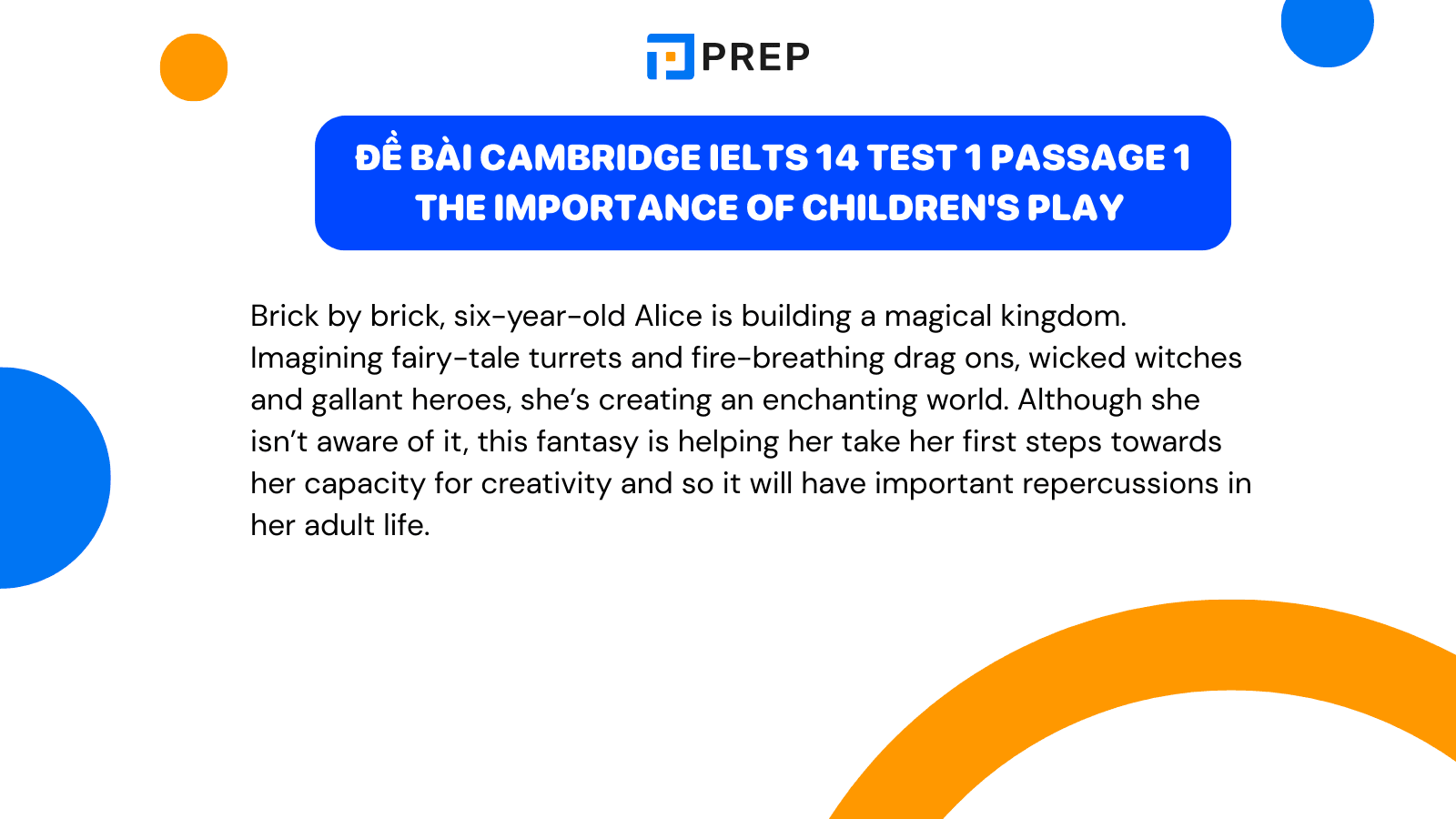
Đề bài Cambridge IELTS 14 test 1 passage 1 the importance of children's play
II. Đáp án
|
Questions |
Đáp án |
|
1 |
creativity |
|
2 |
rules |
|
3 |
cities |
|
4 |
traffic/crime |
|
5 |
traffic |
|
6 |
competition |
|
7 |
evidence |
|
8 |
life |
|
9 |
TRUE |
|
10 |
TRUE |
|
11 |
NOT GIVEN |
|
12 |
FALSE |
|
13 |
TRUE |
III. Giải thích đáp án chi tiết
Question 1-8: Children’s play
Question 1
-
Đáp án: creativity
-
Vị trí: Đoạn 1 dòng 3,4
-
Giải thích đáp án: Đáp án đứng sau động từ “develop” nên cần một danh từ. Theo bài đọc, cụm “her capacity for creativity” chỉ khả năng được phát triển. Đáp án yêu cầu một từ, nên “creativity” là đúng.
Question 2
-
Đáp án: rules
-
Vị trí: Đoạn 2 dòng 3,4
-
Giải thích đáp án: Sau “and” là danh từ “turn-taking”, nên đáp án cũng phải là một danh từ. Theo bài đọc, trẻ học kỹ năng “follow rules” khi chơi “board games”. Vì đáp án cần một danh từ, nên “rules” là từ đúng.
Question 3
-
Đáp án: cities
-
Vị trí: Đoạn 5 dòng 1.
-
Giải thích đáp án: Đáp án đứng sau giới từ “of” nên cần một danh từ. Cụm “populations of …” yêu cầu một danh từ chỉ nơi chốn. Câu hỏi đề cập đến sự thay đổi ảnh hưởng đến vui chơi của trẻ em: dân số ở thành thị tăng. Vì vậy, “cities” là đáp án đúng.
Question 4
-
Đáp án: traffic/crime
-
Vị trí: Đoạn 5 dòng 4.
-
Giải thích đáp án: Đáp án đứng sau giới từ “of” nên cần một danh từ. Câu hỏi yêu cầu một danh từ chỉ lý do hoặc yếu tố làm hạn chế cơ hội vui chơi của trẻ em. Dựa vào bài đọc, “traffic” là đáp án đúng.
Question 5
-
Đáp án: traffic/crime
-
Vị trí: Đoạn 5 dòng 5.
-
Giải thích đáp án: Giống câu 3, đáp án phải là một danh từ. Nỗi sợ thứ hai được nêu trong bài là trẻ em có nguy cơ trở thành nạn nhân của tội phạm. Do đó, “crime” là đáp án phù hợp.
Question 6
-
Đáp án: competition
-
Vị trí: Đoạn 5, dòng 6.
-
Giải thích đáp án: Trước đáp án là tính từ “increased”, nên cần một danh từ được từ này bổ nghĩa. Dựa trên các từ khóa được diễn đạt lại trong bài, từ phù hợp nhất là “competition”. Vì vậy, “competition” là đáp án đúng.
Question 7
-
Đáp án: evidence
-
Vị trí: Đoạn 6, dòng 4.
-
Giải thích đáp án: Đáp án đứng sau động từ “find” nên cần một danh từ. Câu hỏi đề cập đến khó khăn của các chính sách quốc tế về vui chơi trẻ em, đó là việc tìm kiếm chứng cứ để xác nhận hoặc ủng hộ những chính sách mới. Vì vậy, “evidence” là đáp án đúng.
Question 8
-
Đáp án: life
-
Vị trí: Đoạn 8, dòng 2.
-
Giải thích đáp án: Đáp án nằm sau sở hữu cách “child’s” nên cần một danh từ. Câu hỏi nhắc đến việc cần nghiên cứu tác động của vui chơi đối với phần đời còn lại của trẻ. Do đó, “life” là đáp án phù hợp.
Questions 9-13
Question 9
-
Đáp án: TRUE
-
Vị trí: Đoạn 12 dòng 2, 3.
-
Giải thích đáp án:
Dịch: Trẻ em có kỹ năng tự chủ tốt thường học tốt ở trường sau này.
Giải thích: Tất cả từ khóa trong câu hỏi đều được paraphrase và xuất hiện trong bài (phần trích dẫn). Nội dung câu trích dẫn khớp hoàn toàn với thông tin trong câu hỏi, nên đáp án là TRUE.
Question 10
-
Đáp án: TRUE
-
Vị trí: Đoạn 13.
-
Giải thích đáp án:
Dịch: Cách trẻ chơi có thể cung cấp thông tin về các vấn đề sức khỏe tiềm ẩn (trong bài: sự khỏe mạnh và các triệu chứng liên quan…).
Giải thích: Tất cả từ khóa trong câu hỏi đều được diễn đạt lại và tìm thấy trong bài đọc (phần trích dẫn). Nội dung câu trích dẫn khớp với câu hỏi, vì vậy đáp án là TRUE.
Question 11
-
Đáp án: NOT GIVEN
-
Vị trí: Đoạn 14, dòng 4.
-
Giải thích đáp án:
Dịch: Chơi với búp bê được cho là có lợi cho kỹ năng viết của bé gái hơn bé trai.
Giải thích: Trong bài, thông tin về chơi búp bê chỉ nói rằng “Trẻ viết những câu chuyện dài với cấu trúc câu tốt hơn khi chơi với búp bê – đại diện cho những nhân vật trong truyện”. Tuy nhiên, bài không đề cập đến việc so sánh kỹ năng viết giữa bé trai và bé gái. Vì vậy, đáp án là NOT GIVEN.
Question 12
-
Đáp án: FALSE
-
Vị trí: Đoạn 1 dòng 6, 7.
-
Giải thích đáp án:
Dịch: Trẻ gặp khó khăn trong việc nghĩ ra ý tưởng khi bắt đầu tạo dựng câu chuyện với Lego.
Giải thích: Trong bài, giáo viên nói rằng trước đây học sinh thường phàn nàn rằng không biết viết gì, nhưng khi sử dụng Lego, không còn trẻ nào than phiền về việc này nữa. Vì vậy, đáp án là FALSE.
Question 13
-
Đáp án: TRUE
-
Vị trí: Đoạn 16 dòng 1.
-
Giải thích đáp án:
Dịch: Ngày nay, mọi người xem việc vui chơi của trẻ em ít quan trọng hơn so với trước đây.
Giải thích: Câu trong bài viết: “Vì lý do nào đó, tầm quan trọng của việc vui chơi đã biến mất trong những thập kỷ gần đây”, cho thấy trước đây việc vui chơi được xem là quan trọng hơn. Vì vậy, đáp án là TRUE.
Xem thêm: Đề bài và giải thích đáp án Cambridge 16 test 4 Listening part 1 holiday rentals
IV. Từ vựng hay trong bài cần ghi nhớ
|
Từ vựng |
Nghĩa |
Ví dụ |
|
Magical |
(adj) Kỳ diệu, huyền bí |
"Building a ‘magical kingdom’ may help develop creativity." (Xây dựng một ‘vương quốc kỳ diệu’ có thể giúp phát triển khả năng sáng tạo.) |
|
Fantasy |
(n) Giấc mơ, sự tưởng tượng |
"This fantasy is helping her take her first steps towards her capacity for creativity." (Sự tưởng tượng này đang giúp cô bé bước những bước đầu tiên trên con đường phát triển khả năng sáng tạo.) |
|
Pretence |
(n) Sự giả vờ, sự giả tạo |
"She’s practising how to regulate her emotions through pretence." (Cô bé đang tập cách điều chỉnh cảm xúc của mình thông qua sự giả vờ.) |
|
Regulate |
(v) Điều chỉnh, kiểm soát |
"She’s practising how to regulate her emotions through pretence." (Cô bé đang tập cách điều chỉnh cảm xúc của mình thông qua sự giả vờ.) |
|
Curtail |
(v) Cắt bớt, hạn chế |
"Outdoor play is curtailed by perceptions of risk to do with traffic." (Chơi ngoài trời bị hạn chế bởi sự lo ngại về rủi ro liên quan đến giao thông.) |
|
Leisure |
(n) Thời gian rảnh, giải trí |
"International bodies like the United Nations and the European Union have begun to develop policies concerned with children’s right to play, and to consider implications for leisure facilities and educational programmes." (Các tổ chức quốc tế như Liên Hợp Quốc và Liên minh Châu Âu đã bắt đầu phát triển các chính sách liên quan đến quyền chơi của trẻ em, và xem xét các tác động đối với cơ sở vật chất giải trí và các chương trình giáo dục.) |
|
Self-control |
(n) Kiểm soát bản thân |
"Play supports the early development of children’s self-control." (Chơi giúp phát triển khả năng kiểm soát bản thân của trẻ em từ sớm.) |
|
Self-regulate |
(v) Tự điều chỉnh |
"The ability to self-regulate has been shown to be a key predictor of academic performance." (Khả năng tự điều chỉnh đã được chứng minh là yếu tố dự đoán quan trọng về kết quả học tập.) |
|
Neurodevelopmental |
(adj) Phát triển thần kinh |
"Observing children at play can give us important clues about their well-being and can even be useful in the diagnosis of neurodevelopmental disorders like autism." (Quan sát trẻ khi chơi có thể cung cấp cho chúng ta những manh mối quan trọng về sức khỏe của chúng và thậm chí có thể hữu ích trong việc chẩn đoán các rối loạn phát triển thần kinh như tự kỷ.) |
|
Stimulus |
(n) Sự kích thích |
"A playful stimulus was far more effective than an instructional one." (Một sự kích thích mang tính chơi đùa hiệu quả hơn rất nhiều so với sự hướng dẫn thông thường.) |
|
Hotly debated |
(adj) Được tranh luận nảy lửa |
"The landscape is very different, with hotly debated topics such as school starting age." (Cảnh quan hiện nay rất khác biệt, với những chủ đề tranh luận nảy lửa như độ tuổi bắt đầu đi học.) |
|
Trivial |
(adj) Tầm thường, không quan trọng |
"Somehow the importance of play has been lost in recent decades. It’s regarded as something trivial." (Bằng cách nào đó, tầm quan trọng của việc chơi đã bị quên lãng trong những thập kỷ gần đây. Nó bị coi là điều tầm thường.) |
|
Benefits |
(n) Lợi ích |
"Let’s not lose sight of its benefits, and the fundamental contributions it makes to human achievements." (Hãy không quên những lợi ích của nó, và những đóng góp cơ bản mà nó mang lại cho thành tựu của con người.) |
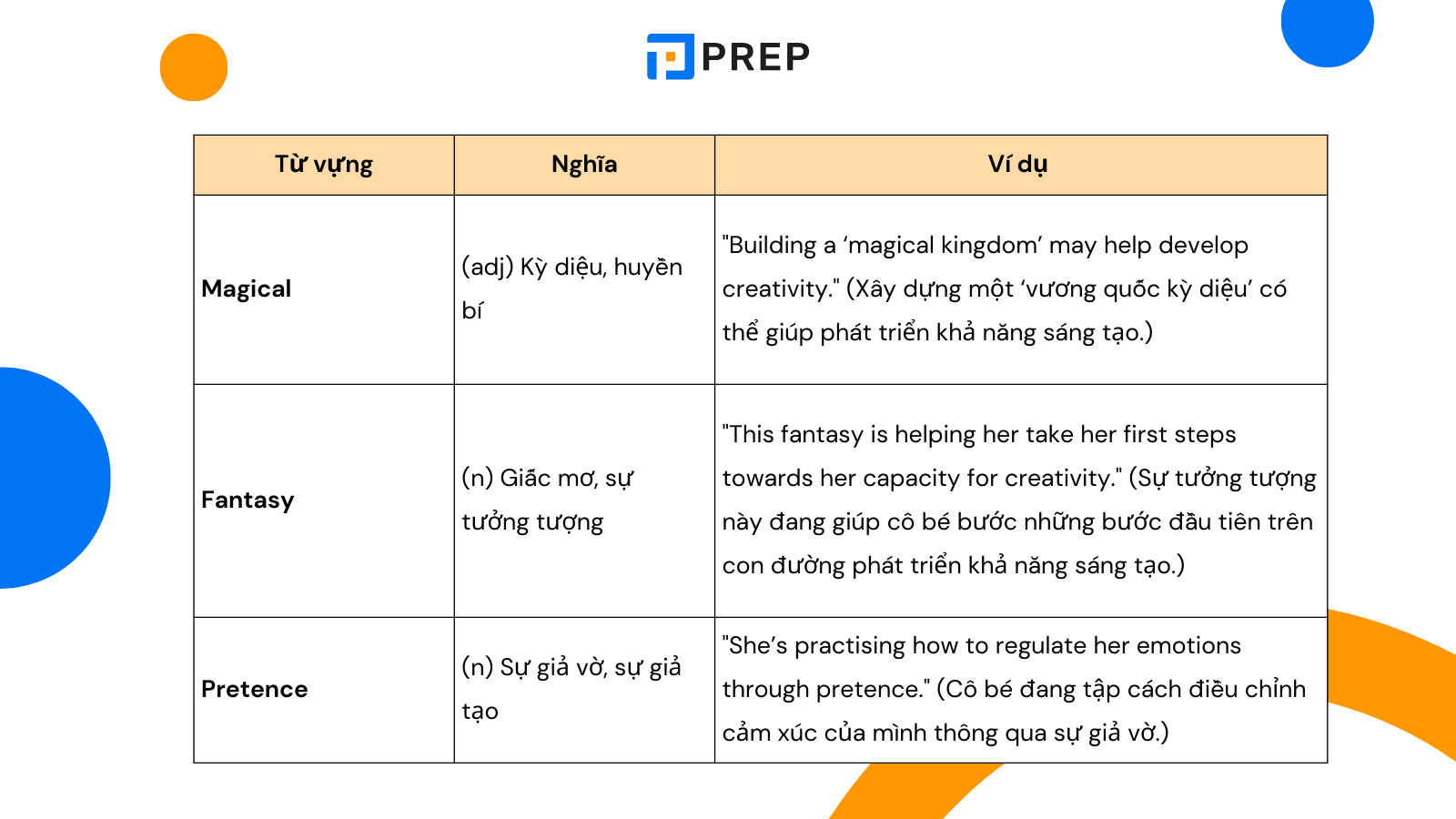
Trên đây là đề bài và đáp án chi tiết của đề Cambridge IELTS 14 test 1 passage 1 the importance of children's play. Hy vọng tài liệu trên sẽ hữu ích cho việc luyện thi IELTS và giúp bạn đạt được band điểm như mong đợi nhé!
Học tiếng Anh online dễ dàng hơn với PREP - Nền tảng Học & Luyện thi thông minh cùng AI. Nhờ công nghệ AI độc quyền, bạn có thể tự học trực tuyến ngay tại nhà, chinh phục lộ trình học IELTS, TOEIC, tiếng Anh giao tiếp hiệu quả. Bên cạnh đó, học viên còn có sự hỗ trợ tuyệt vời từ Teacher Bee AI, trợ lý ảo giúp bạn giải đáp thắc mắc và đồng hành 1-1 trong suốt quá trình học tập. Hãy click TẠI ĐÂY hoặc liên hệ HOTLINE 0931428899 để nhận tư vấn chi tiết về các khóa học tiếng Anh chất lượng nhất thị trường!
Tải ngay app PREP để bắt đầu hành trình học tiếng Anh tại nhà với chương trình học luyện thi online chất lượng cao.

Chào bạn! Mình là Hiền Hoàng, hiện đang đảm nhận vai trò quản trị nội dung sản phẩm tại Blog của website prepedu.com.
Với hơn 5 năm tự học các ngoại ngữ như tiếng Anh, tiếng Trung và ôn luyện một số kỳ thi IELTS, TOEIC, HSK, mình đã tự đúc rút được nhiều kinh nghiệm để hỗ trợ hàng nghìn người đang gặp khó khăn trong việc học ngoại ngữ. Hy vọng rằng những chia sẻ phía trên sẽ giúp ích cho bạn trong quá trình tự ôn luyện thi hiệu quả tại nhà!
Bình luận
Nội dung premium
Xem tất cảLộ trình cá nhân hoá
Có thể bạn quan tâm
Kết nối với Prep
MSDN: 0109817671.
Địa chỉ liên hệ: Tòa nhà Vinaconex, 34 Láng Hạ, phường Láng, TP Hà Nội.
Địa chỉ kinh doanh: Lô 21 C2 Khu đô thị Nam Trung Yên, phường Yên Hòa, TP Hà Nội.
Trụ sở: Số nhà 20, ngách 234/35 đường Hoàng Quốc Việt, phường Nghĩa Đô, TP Hà Nội.
Phòng luyện ảo - Trải nghiệm thực tế - Công nghệ hàng đầu.
Hotline: 0931 42 8899.
Trụ sở: Số nhà 20, ngách 234/35 đường Hoàng Quốc Việt, phường Nghĩa Đô, TP Hà Nội.
Giấy chứng nhận hoạt động đào tạo, bồi dưỡng số 1309/QĐ-SGDĐT ngày 31 tháng 07 năm 2023 do Sở Giáo dục và Đào tạo Hà Nội cấp.
